***Updated***
Clean, healthy bedding is the key to having healthy birds, especially in the winter. Poorly
maintained bedding can lead to many health issues such as respiratory problems, mite/lice
infestations, higher susceptibility to frost bite, and a host of other health problems and
deceases. Here are some quick guidelines to maintaining your bedding.
parts-per-million. The human nose cannot smell ammonia until it reaches Twenty five parts-
per-million. Yes, that's right your birds lungs are being damaged before you can even detect
any odder! Avoid this by adding a light layer of bedding every day or so. If you don't do deep
bedding, them make shore you clean out and replace bedding on a regular basis. Throw down
some scratch grains and let the chickens stir it up. It will help it break down faster and give your
birds something to do.

cause hosts of health issues. Keep your coop well ventilated. Many of us are tempted to build
fully enclosed chicken coops, fully insulated and enclosed. This is not necessary if you live in
a climate where the temperature does not drop below -10. My coops are uninsulated, open
and airy, and my birds have done just fine in temps that low. Avoid overly dusty materials such
as saw dust, and never use anything that is moldy or musty. Do not let manure collect any
where (i.e tops of nest boxes, boards, roosts etc) as it can dry and produce dust. Remember,
your birds are constantly moving around during the day, so dust and mold will never have
chance to settle.

coops containing moist, poorly circulated air are far more likely to have frost bite issues
then those housed in dry coops. Again, ventilation is very necessary. Keep your waters out in
the runs to avoid spillage onto the bedding. This is especially important if you keep
water fowl. If possible, have proper drainage around your coop to prevent water from running
underneath.

inch deep mud. Believe me, this is not pleasant or healthy for them. Chickens kept in these
conditions often have scale problems, and are more susceptible to getting scaly leg mites.
Put down a good layer of wood chips, straw, etc, preferably before your run becomes overly
muddy. If possible, move your run and coop to a fresh spot every season or so.

summer sprinkle fresh flowers on the floor and nest boxes. During the winter months collect
and spread fresh grass clippings in your coop. Your birds will enjoy eating them and they will
add a freshness to your coop. Also sprinkling dried herbs such as citronella (a natural pest
repellent) is also very beneficial, and will help with pests.

but nobody likes to get a dirty egg. Avoid this by cleaning out your nest boxes on a regular
basis. Your birds prefer a clean, comfortable nests, if the nests you provide do not meet this
description, than your hens will likely find another place to lay, and it may not be a place you
will be able to find. Avoid an easter egg hunt every day by making sure your nest boxes are as
clean and comfortable as possible.

Click here for part 1 of this article: https://www.backyardchickens.com/a/bedding-part-1-compareing-materials
Special thanks to Mountain Peeps for letting my use her photos.
If you have any question or comments feel free to post below!
Thanks for reading.
Clean, healthy bedding is the key to having healthy birds, especially in the winter. Poorly
maintained bedding can lead to many health issues such as respiratory problems, mite/lice
infestations, higher susceptibility to frost bite, and a host of other health problems and
deceases. Here are some quick guidelines to maintaining your bedding.
- Ammonia build up
parts-per-million. The human nose cannot smell ammonia until it reaches Twenty five parts-
per-million. Yes, that's right your birds lungs are being damaged before you can even detect
any odder! Avoid this by adding a light layer of bedding every day or so. If you don't do deep
bedding, them make shore you clean out and replace bedding on a regular basis. Throw down
some scratch grains and let the chickens stir it up. It will help it break down faster and give your
birds something to do.
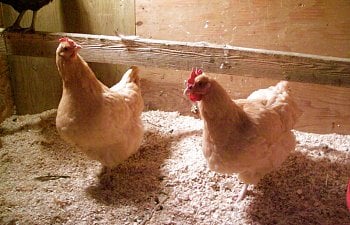
- Dust and Ventilation
cause hosts of health issues. Keep your coop well ventilated. Many of us are tempted to build
fully enclosed chicken coops, fully insulated and enclosed. This is not necessary if you live in
a climate where the temperature does not drop below -10. My coops are uninsulated, open
and airy, and my birds have done just fine in temps that low. Avoid overly dusty materials such
as saw dust, and never use anything that is moldy or musty. Do not let manure collect any
where (i.e tops of nest boxes, boards, roosts etc) as it can dry and produce dust. Remember,
your birds are constantly moving around during the day, so dust and mold will never have
chance to settle.
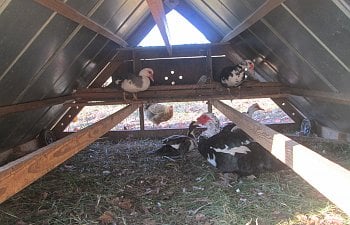
- Moisture
coops containing moist, poorly circulated air are far more likely to have frost bite issues
then those housed in dry coops. Again, ventilation is very necessary. Keep your waters out in
the runs to avoid spillage onto the bedding. This is especially important if you keep
water fowl. If possible, have proper drainage around your coop to prevent water from running
underneath.
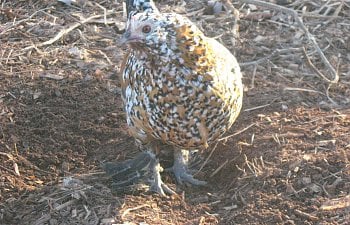
- Muddy runs
inch deep mud. Believe me, this is not pleasant or healthy for them. Chickens kept in these
conditions often have scale problems, and are more susceptible to getting scaly leg mites.
Put down a good layer of wood chips, straw, etc, preferably before your run becomes overly
muddy. If possible, move your run and coop to a fresh spot every season or so.
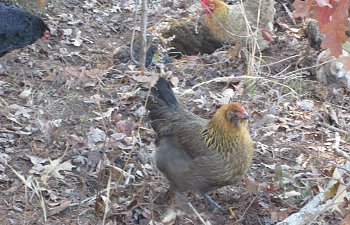
- Freshen your bedding
summer sprinkle fresh flowers on the floor and nest boxes. During the winter months collect
and spread fresh grass clippings in your coop. Your birds will enjoy eating them and they will
add a freshness to your coop. Also sprinkling dried herbs such as citronella (a natural pest
repellent) is also very beneficial, and will help with pests.
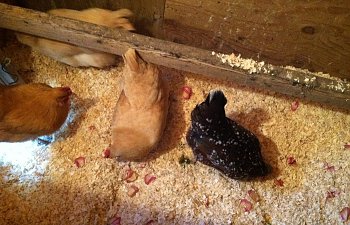
- Nest boxes
but nobody likes to get a dirty egg. Avoid this by cleaning out your nest boxes on a regular
basis. Your birds prefer a clean, comfortable nests, if the nests you provide do not meet this
description, than your hens will likely find another place to lay, and it may not be a place you
will be able to find. Avoid an easter egg hunt every day by making sure your nest boxes are as
clean and comfortable as possible.
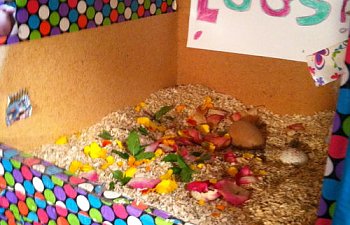
Click here for part 1 of this article: https://www.backyardchickens.com/a/bedding-part-1-compareing-materials
Special thanks to Mountain Peeps for letting my use her photos.
If you have any question or comments feel free to post below!
Thanks for reading.
